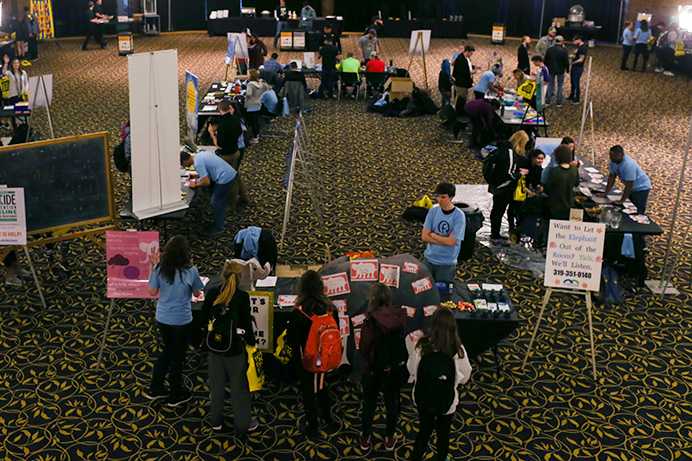By Naomi Hofferber
naomi-hofferber@uiowa
For many college students, a large portion of their health goes widely ignored. One in four people will suffer from mental illness for some part of their life, yet the stigma keeps individuals from seeking help.
Fresh Check Day, UI’s first mental-health fair, aimed to address stigma and offer resources to students who may be struggling.
“It’s a place where you can come and check in on your mental health,” UI Active Minds President Kelin Silber said. “It’s just a really nice event where you can come in, talk to people, do events that really promote positivity, promote awareness, promote ending the stigma, and promote your own self.”
Silber said the most common age for individuals to take their own lives is ages 20-24, which includes a lot of college students.
“In our culture today, we are taught about overexertion, but we are taught in a way that it’s what you are supposed to do, you’re supposed to do a bunch of things,” Silber said. “Once you do that, you don’t take the time to sit down and recognize yourself. One in four adults will suffer from mental illness in their lives, and even though that’s the case, two-thirds of students won’t seek out that treatment.”
At the fair, the Rape Victim Advocacy Program gave students an opportunity to write messages of support for survivors and learn ways to cope with issues.
“We are here to provide support to students,” Emily Milke of RVAP said. “We know that sexual violence can impact mental health. Everyone kind of copes with that differently; some people seek out official counseling or therapy, oftentime, folks don’t, and that’s OK. RVAP is here for folks who are having a bad day, who want to talk to someone, who have advocacy needs, and all our services are free, confidential, and totally optional.”
April is Sexual Assault Awareness Month, and RVAP has events throughout to raise awareness and offer support for survivors.
Rachel Liddle, a substance-abuse counselor at Student Health & Wellness, had a booth in the fair that discussed issues of mental health with alcohol and drinking behaviors.
“A lot of times when people are thinking about alcohol and mental health, they think about substance-abuse disorders or dependence or alcoholism, but that’s not what we’re talking about here,” she said. “Even one episode of binge drinking or higher-risk drinking can impact mental health. It’s really all kind of things: worsening mental-health conditions that are already existing or things like rebounding anxiety even after even one episode of binge drinking kind of leading to the manifestation of mental-health issues.”
Liddle said 25 percent of students on campus abstain from alcohol consumption, and alcohol can affect mental health regardless of whether someone has a mental illness.
“I think mental health is a huge part of our overall health and wellness,” she said. “For a long time in society in general, we thought of health and mind to be separate from each other, but we are finally understanding, as we should, that the brain and mental health goes hand in hand with our physical health. It’s important to break down stigma so people can get proper treatment, so people can be their best.”
Booths around the IMU offered information, activities, and resources for students regarding their mental wellness. One booth gave people the opportunity to write the issues they struggle with, or their “elephant in the room,” on a piece of paper. The paper would be anonymously shared on a board with other students’ “elephants” to show many struggle with the same issue.
“Your lives matter,” Silber said. “Things like these make you take the time to recognize that and maybe seek the help that you’re looking for.”



